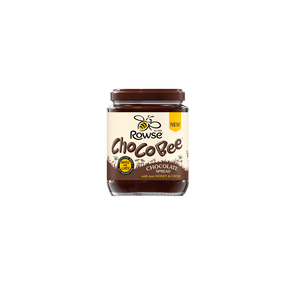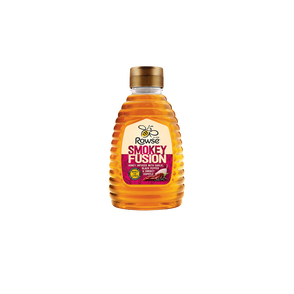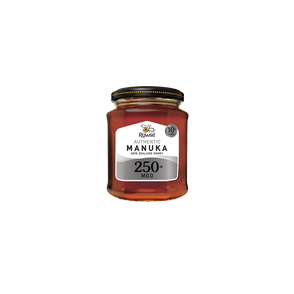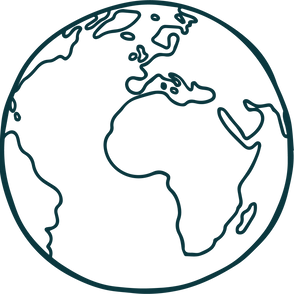
Have a question? Find the answer in our FAQs.
About
What’s the difference between organic and non-organic honeys?
Our Organic honey comes from approved supply bases all over the world. As we pack the honey in the UK the certifying body that we choose to use is The Soil Association. This is why the statement regarding their approved apiaries is present on our label. This statement applies to Organic honey from any country, hence all organic honey must meet the same strict standards. Any company that exports honey will be certified by an Organic body. (The body that they use does not necessarily have to be from the country the honey is from). We then have to supply the certifying body details to The Soil Association, who check the standards being used meet their requirements. If they do, we are authorised to use the honey with The Soil Association logo. We are audited by The Soil Association on a regular basis and checking that the certifying bodies are approved by them forms part of this audit. In addition to The Soil association standards we also test Organic honey on delivery to us in the same way that we test non-organic honey. This ensures that it is fully compliant to the UK Honey Regulations.
What’s the shelf life of honey?
Honey never really goes off as it contains a high amount of natural sugar. We print best before dates on all our packaging and recommend that the honey is consumed before this date. We also recommended that you keep your honey in a cupboard at room temperature.
Why do you blend some of your Rowse honey products?
Honey is a natural product and subject to seasonal variation and availability so, on this basis, we source globally to ensure a high-quality consistent supply. In recognition of this naturally occurring variation each year, the UK (and formerly the EU) has approved honey from many countries as suitable for import and consumption in the UK (and formerly in the EU member states) to ensure there is no shortage in supply to meet consumer demand.. The UK government publish the list of approved origins which you can view via this link:https://www.food.gov.uk/business-industry/imports/honey
Rowse Honey has built up a specialist team of sensory panellists who approve all honeys to specific recipes depending on taste profiles and the natural colour of the honey. Some honeys can be fruity as well as sweet, others can be slightly smoky, or taste of butterscotch, candy floss or toffee. We carefully choose different types of honey to achieve a final product that is consistent in flavour, colour, aroma and texture all year round.
Is Rowse honey raw / unpasteurised / cold filtered or heated as part of the preparation?
The UK (and formerly EU) honey regulations don’t allow honey packers to heat honey to pasteurisation temperatures as this may destroy the natural enzymes that have to be present to be lawfully declared as honey.All our honeys arrive at Rowse in their natural state and we gently warm them through to filter out bee wax or hive parts. The honey we pack into our bottles and jars is pure and natural and never pasteurised.The term “raw” isn’t recognised in the UK (and formerly EU) honey regulations and we believe the term is misleading, therefore it is not used by Rowse in its labelling, marketing or website.
Does Rowse honey contain any pesticides?
At Rowse Honey, we adhere to strict standards that are set within the honey industry and local legislation at all times. Before Rowse accepts any honey, it must undergo a number of tests in both its home country and in the UK. Every batch is also independently tested in an accredited laboratory. The honey we buy is not released for sale until it passes these stringent tests which include screening for a comprehensive list of pesticide residues, as well as necessary standards of traceability, transparency and authenticity like sugar syrup adulteration checks and antibiotic residue testing.
How do I turn my honey back to being runny?
Sometimes honey crystalises when it gets cold. It’s completely harmless, and just means glucose has separated from the rest of the sugars because of the temperature. You can dissolve the crystals by putting the honey jar in an airing cupboard or a basin of hot water until it becomes clear.
ChocoBee
Is the cocoa sustainable?
The cocoa in Rowse ChocoBee is UTZ-certified. UTZ is the largest programme in the world for sustainable cocoa, and is part of the Rainforest Alliance.UTZ say: “The cocoa sector faces several challenges. Poor soil fertility management, aging tree stocks, improper use of chemicals and uncontrolled deforestation are threats to the sustainability of cocoa farming. At the same time farmers are faced with poor labour conditions and low income. Consumers are increasingly aware of these situations, and demand products that are grown in a responsible way.With UTZ members, we are committed to making a difference for the cocoa sector. Our goal is to create an efficient sustainability program with effective certification and traceability tools for socially and environmentally responsible cocoa production that meets the needs of both producers and markets.”For more information, please see https://utz.org/what-we-offer/certification/products-we-certify/cocoa/.
What is Rowse Hives for Lives?
Rowse Hives for Lives is a programme of sustainability initiatives developed to help protect the incredible honeybees and improve livelihoods through beekeeping.We have three partnership initiatives that support the Rowse Hives for Lives programme:
- The Sussex Plan – Rowse sponsor a programme at the University of Sussex that funds vital research into bee health and the protection of honey bees.
- BFA Apprenticeship scheme – The Rowse and Bee Farmers Association apprenticeship scheme to help inspire, recruit and train the next generation of young British bee farmers.
- Bees for Development – This initiative aims to offer a sustainable pathway out of poverty by supporting communities in Ethiopia to earn income from honey. The project helps underpin the ecosystem on which thousands of rural families rely on for their livelihoods.
How can I use Rowse ChocoBee?
Rowse ChocoBee is super versatile!You can use it as a chocolate spread for breakfast, to take your toast, bread, pancakes, muffins, crumpets, croissants, brioches, or even porridge to new heights.Rowse ChocoBee can also be used as a dip – think about instant chocolate fondue, with strawberries, bananas, brioche or simply with some breadsticks in your child’s lunchbox.Rowse ChocoBee also makes an amazing hot drink, simply add a few tea spoons into hot milk, stir and voila! Rowse ChocoBee is also great for baking – to ice/top a cake, to spread on a slice of banana bread, to sandwich two biscuits together…The possibilities are endless, just be creative and tag us on social media using #ChocoBee!
What are the nutritional values?
Typical values per 100g:
- Energy: 1345kJ/322kcal
- Fat: 1.1g
- Of which saturates: 0.6g
- Carbohydrates: 75.6g
- Of which sugars: 74.2g
- Fibre: 2.4g
- Protein: 2g
- Salt: 0.01g
- Energy: 202kJ/48kcal
- Fat: 0.7g
- Of which saturates: 0.09g
- Carbohydrates: 11.3g
- Of which sugars: 11.1g
- Fibre: 0.36g
- Protein: 0.3g
- Salt: 0.0015g
Why is Rowse ChocoBee not suitable for children under one?
Rowse ChocoBee contains honey and we advise that children under the age of 12 months should not consume any of our honeys. A voluntary label declaration exists on all of our packaging which states ‘Unsuitable for infants under 12 months’.
Do you add anything else to the honey and the cocoa?
No, we do not add anything. Rowse ChocoBee is made with only two ingredients: honey & cocoa. ChocoBee also doesn’t contain any allergens.
Dietary
Is honey ok to eat while pregnant?
Despite our honey being unpasteurised we would still suggest it’s safe to eat during pregnancy. Although we do not advise that children under the age of 12 months old should consume any of our honeys, this is because an infant’s digestive tract isn’t quite ready to process some of the naturally-occurring constituents in honey and this inability could potentially cause problems. Should you have any concerns surrounding this we would advise you contact your GP or Midwife.
Are Rowse products gluten free?
Honey is naturally gluten free, whilst we do not have gluten on site, we do not test the honey for gluten.
Is Rowse honey suitable for vegans?
Honey is a by-product of bees so suitability is down to individual preference.
Fusion
Is the Fusion range suitable for vegetarians?
Yes, it is.
What is the recommended portion size?
It depends on the recipe and the desired strength of flavour wanted, however we recommend adding 2-3 teaspoons to a stir fry dish (serving 2).
Where to store Rowse Fusion?
The Fusion honeys should be stored at room temperature.
How should I use the Fusion honeys?
We recommend experimenting with Chilli Fusion in any savoury cooking – our favourites are in a simple mid-week stir fry sauce, drizzled on fried chicken or pizza or spread onto a strong cheddar cheese and cracker.
Are there any allergens in Fusion?
No, however chilli is classed as an irritant.
Manuka
Should Manuka honey be refrigerated?
No, avoid storing honey in the fridge. Manuka honey should be stored at room temperature to avoid crystallisation.
Does Manuka honey expire?
Manuka honey never really expires as it contains a high amount of natural sugar. However, all of our jars have best before dates on so we recommend that Manuka is not consumed beyond that date.
How should I use Manuka honey?
You can enjoy Manuka straight from the jar and have a spoonful every morning. You can also use it to replace your everyday honey to top your favourite breakfast like porridge and toast. It is also delicious mixed into a drink of hot water, lemon juice and ginger slices. For more inspiration, visit the recipe pages.
Is Manuka honey suitable for vegetarians?
Yes, Manuka honey, like all other honey, is suitable for vegetarians.
How should I store Manuka honey?
Ensure that you store Manuka honey at room temperature to avoid crystallisation from happening. Around 80% of honey's composition is natural sugars, transformed by the bees from nectar. These natural sugars, which are mainly fructose and glucose, remain liquid at room temperature, but at colder temperatures, the glucose separates from the rest of the sugars and forms small crystals. These are harmless.
Can I use Manuka honey during pregnancy?
The FSA state that all honey is fine for pregnant women, but as always, we advise pregnant women to speak to their midwife or doctor if concerned.
What should I do if my Manuka honey crystallises?
If your Manuka honey crystallises, simply stand the honey jar in your airing cupboard or a basin of warm water for a little time and they'll disappear.
How much Manuka honey should I take per day?
We recommend a spoonful every morning.
Is Rowse Manuka honey packaging recyclable?
Yes, the Rowse Manuka honey packaging is fully recyclable. In fact, the glass jar even contains 50% recycled glass material.
Where can I buy Rowse Manuka honey?
Rowse is the leading Manuka brand and is available nationwide in all major supermarkets. For stockist details on each of our Manuka honeys, click on the relevant product below:
What are the key ingredients of Rowse Manuka honey?
Rowse Manuka honey only contains one ingredient: 100% pure and authentic, Monofloral Manuka Honey from New Zealand, with nothing added or taken away.
Is Rowse Manuka honey raw?
The term “raw” isn’t recognised in the UK honey regulations and we believe the term is misleading, therefore we do not use it in our labelling, marketing or website. However, Rowse honey is 100% pure and natural, arriving in its natural state and gently warmed through to pack into our bottles and jars.
Is Manuka honey suitable for children?
Manuka honey is suitable for children, but we advise that children under the age of 12 months should not consume any of our honeys.A voluntary label declaration exists on all of our packaging which states ‘Unsuitable for infants under 12 months’.
Is Manuka honey suitable for vegans?
Manuka honey is not suitable for vegans as it’s made by bees.
Provenance
Is Rowse honey fully traceable and authentic?
When you buy Rowse Honey you can be assured all our honey is 100% pure and natural, with nothing added and nothing taken away, and can be traced directly back to the beekeepers.We conduct extensive testing with leading independent laboratories to test the quality and purity of all sourced honey to meet the regulations set out to us and to ensure all our honey is 100% pure and natural.All honey coming into the UK is checked on entry by port health authority, including random testing, and must meet or exceed the compositional standards for honey as defined in the UK and European regulations. We carefully test every batch of our incoming supplies of all honeys to ensure their purity before we pack them into jars and bottles, to give our consumers the best pure and natural honey. These checks include necessary standards of traceability, transparency, authenticity. We are very clear in the raw material specification that all the honey must comply with the honey regulations of 2015.
Where is Rowse honey from?
Unfortunately, the UK is not self-sufficient in honey production, and this means that to meet consumer demand, over 90% of honey needs to be imported.At Rowse Honey we sell a variety of single origin honeys, including Rowse Heather Max (British heather honey) and British Honey. The origin is clearly marked on the label, as required by UK legislation.We also sell honey that is blended from a variety of countries that is very popular with UK consumers. Rowse specially selects honeys from all over the world, from all major honey-producing continents including South America, Europe, Asia, Australia and Oceania, to pack a pure and natural honey that is consistent in flavour, colour, aroma and texture all year round. We do this by working with our supply base and beekeepers to follow the harvest and secure the correct quality honey. The UK (and formerly EU) Legislation stipulates we can only purchase honey from approved countries that comply with UK regulations - this currently comprises over 20 countries worldwide (including New Zealand, China, Mexico, Greece and Hungary) depending upon seasonal availability, and states we label it with either EU, Non-EU, or both origins.Honey packers adapt their blends and change origins to maintain the honey flavour profile preferred by consumers. Periodic changes of origin in a blend do not indicate any change of quality of the honey.As a consequence, UK labelling regulations allows for changes in origin and blends, arising from the fact that honey is a natural product, made by honeybees, subject to seasonal variation and availability.




